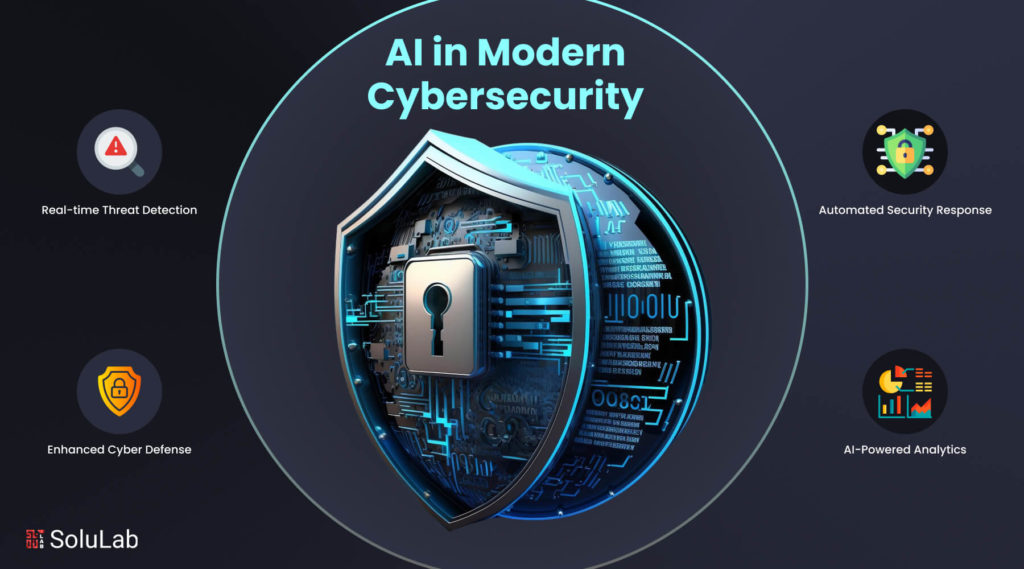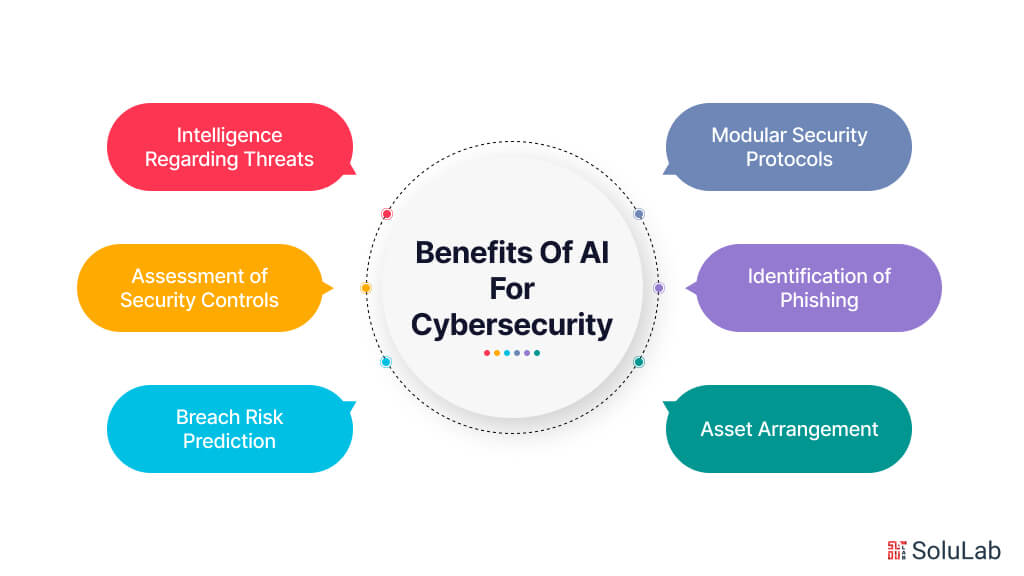
In today’s environment, artificial intelligence (AI) has completely changed the game. The use of artificial intelligence (AI) in cybersecurity problems is quite beneficial. It facilitates the development of intelligent agents, which might be software or hardware. These agents are made to observe, learn, and make deft judgments in order to cope with certain security concerns in an efficient manner. They are able to detect vulnerabilities in intricate code, observe peculiar trends in user login behavior, and even detect novel forms of malicious software that conventional tools could overlook.
Intelligent agents analyze large amounts of data in order to spot trends. These insights are applied in defensive systems to examine incoming data, including previously unseen information.
AI is becoming more and more important in cybersecurity, and many businesses are using it as a vital component of their security plans.
Why Does AI Matter For Cybersecurity?
AI’s capacity to offer sophisticated threat detection, automate responses, adjust to changing threats, and manage extensive data analysis makes it crucial for cybersecurity. Al in Modern Cybersecurity tactics is becoming more and more necessary as cyber threats continue to change in order to maintain strong and efficient defenses.
-
Advanced Threat Detection
More precise and advanced threat detection is made possible by AI. Large datasets may be analyzed by machine learning algorithms, which can then quickly spot trends, abnormalities, and possible dangers. This proactive strategy makes it possible to identify new risks early on, even complex and yet undetected attacks.
-
Behavioral Analytics
AI in Cybersecurity is particularly good at behavioral analytics, which examines trends in network activity and user behavior. AI security systems may identify abnormalities or departures from the norm that can point to a security risk by setting up a baseline of typical activity. This assists in detecting zero-day attacks and insider threats that conventional security procedures could overlook.
-
Automated Reaction to Events
Processes for automating incident response are made easier by AI. AI systems have the capacity to quickly and efficiently respond to security problems because they can learn from past data and adjust to new information. Automated reactions can lessen the effects of an attack and cut down on the amount of time needed to find, stop, and fix security breaches.
-
Modular Security Protocols
Security systems may change and adapt thanks to artificial intelligence (AI) when the threat shifts. Artificial intelligence (AI) can adapt and upgrade its algorithms on a constant basis to keep ahead of new dangers as they arise. This flexibility is essential to keeping strong Al for Cybersecurity protections in place.
-
Extensive Data Interpretation
Massive volumes of data are produced by cybersecurity from a variety of sources, including network traffic, user activity, and logs. Large-scale data handling and analysis are capabilities of AI, which it may use to spot patterns and trends that could point to a security risk. Big data processing skills are necessary for efficient cybersecurity in today’s networked and data-driven workplaces.
-
Cut Down on False Positives
AI can assist in lowering the quantity of security warnings that are false positives. Conventional security systems frequently produce false alerts, which can cause alert fatigue and cause users to miss actual dangers. Artificial intelligence (AI) aids in differentiating between real dangers and false alarms by contextualizing data and understanding typical behavior patterns.
Related: Evolution of AI in Cybersecurity
-
Constant Observation and Flexible Education
AI makes it possible to continuously monitor systems and networks, giving real-time insights on any security threats. Furthermore, AI systems are able to update their knowledge of typical behavior over time, adjust to changes in the environment, and learn from current actions.
Is Cybersecurity Automation Safe?
Like every technology, cybersecurity automation has its drawbacks and concerns, but it may also be a useful and effective strategy. Although there are many advantages to automating cybersecurity, it’s important to find a balance and combine automation with human knowledge. A strong defense against the wide range of cyber threats requires the cooperation of automated technologies and knowledgeable cybersecurity experts.
1. Quickness and Effectiveness
Cybersecurity process speed and efficiency may be greatly increased by automation. When compared to human approaches, automated systems are far faster at analyzing large volumes of data, identifying dangers, and responding to incidents. This speed is essential given how quickly cyber threats are changing.
2. Cut Down on Human Error
Automation lessens the possibility of human mistakes, which frequently contribute to cybersecurity events. Automated systems reduce the possibility of errors that might result in security vulnerabilities by reliably adhering to predetermined security procedures.
3. 24×7 Observation And Reaction
Constant network and system monitoring is made possible by automated cybersecurity solutions, which offer a preventative measure against any attacks. Maintaining this ongoing watchfulness manually is difficult, particularly in expansive and complicated IT infrastructures.
4. The Ability To Scale
Systems that are automated can readily grow to manage a lot of data and a variety of security jobs. Scalability like this is crucial for enterprises with intricate infrastructures and lots of network traffic.
5. Typical and Repeated Tasks
Routine and repetitive duties are best left to automation, freeing up human cybersecurity experts to concentrate on more intricate and strategic areas of security. This raises job happiness and makes the best use of human knowledge.
But there are things to think about and possible difficulties:
6. Inaccurate Positive Results
If automation is used excessively, there may be more false positives—legitimate actions that are mistakenly reported as possible threats. Cybersecurity experts may get alert fatigued as a result, missing real dangers.
7. Intelligent Opponents
The sophistication of cyber attackers is on the rise, and some of them may deliberately craft assaults that evade automated detection systems. It still takes human judgment and analysis to spot sophisticated, focused assaults.
8. Legal and Ethical Issues to Consider
Legal and ethical concerns arise when cybersecurity procedures are automated, especially when it comes to autonomous decision-making. In cybersecurity, figuring out how much autonomy and accountability is right is a constant struggle.
How Can Artificial Intelligence Help Cybersecurity Professionals?
Security experts benefit from artificial intelligence (AI) in cybersecurity because it can recognize complex data patterns, provide insightful guidance, and enable automatic problem-solving. It facilitates decision-making, expedites incident response, and makes it simpler to identify possible threats.
Three basic approaches are used by AI to handle complex security issues:
1. Pattern Recognition
AI excels at identifying and classifying data patterns that humans may find challenging to comprehend. Security experts may examine these patterns more closely thanks to this display.
2. Practical Suggestions
Based on the patterns found, intelligent computer programs (also known as intelligent agents) recommend doable actions. This makes it easier for security experts to know what to do.
3. Independent Mitigation
Certain intelligent algorithms are capable of resolving security issues on their own, eliminating the need for security experts to do it in person.
These astute initiatives seek to improve even the most proficient security personnel and well-equipped facilities that a firm may currently possess. They strengthen the defense as a whole by providing additional assistance. A crucial first step in protection is identifying vulnerabilities that an attacker may exploit. Artificial intelligence (AI) improves the accuracy of source code scanning, which reduces errors and aids engineers in identifying security issues prior to deploying programs.
AI aids in danger response as well. Assisting the security team with specifics and threat intelligence, intelligent AI systems provide information. The team can react to situations more swiftly and efficiently with the additional information, which improves incident response overall.
Al in Modern Cybersecurity transforms how businesses safeguard their systems and data, going beyond conventional techniques. Security experts grow more adept at identifying concerns, responding to risks before they become serious problems, and using intelligent automation to keep one step ahead of cyber dangers in a constantly evolving environment by combining Al for Cybersecurity.
What Are The Benefits Of AI For Cybersecurity?

Because AI offers real-time monitoring, automated incident response, behavioral analytics, and enhanced threat identification, cybersecurity benefits greatly from AI. However, we must examine how cybersecurity experts are equipped with more potent tools to combat the ever-changing environment of cyber threats as a result of the integration of AI security. The methods to improve human teams’ intelligence in several cybersecurity fields are listed below, including:
1. Modular Security Protocols
By constantly learning and upgrading their algorithms, AI systems are able to adjust to changes in the threat scenario. Compared to static security measures, this flexibility offers more protection against emerging and changing cyber threats.
2. Identification of Phishing
AI security improves phishing attempt detection by examining email content, sender behavior, and other aspects. Employee vulnerability to social engineering attacks can be decreased by using machine learning algorithms to detect trends linked to phishing emails.
3. Asset Arrangement
AI can guarantee an accurate and complete log of all the devices, users, and apps that are gaining access to information systems. Sort and assess their significance to the company in order to ensure efficient administration and organization.
4. Intelligence regarding threats
Keep up with threats that are particular to your sector and the world at large so that firms may rank security measures according to likelihood and possible impact. This enhances security by enabling strategic decision-making.
5. Assessment of Security Controls
To strengthen the overall security posture, assess the influence and efficacy of the security tools and procedures currently in place. This entails evaluating the effectiveness of our present security measures and pinpointing areas in need of development.
6. Breach Risk Prediction
By taking into account variables like IT asset inventory, threat exposure, and the efficacy of security controls, AI may assist in anticipating vulnerabilities and possible security breaches. By being proactive, resources may be allocated to reduce hazards before they become significant occurrences.
By integrating Al in Modern Cybersecurity, companies may improve resilience against cyberattacks, fortify their defenses, and enable effective communication and decision-making in the risk environment.
Conclusion
Artificial intelligence (AI) is revolutionizing the field of cybersecurity, offering advanced tools and techniques to combat evolving threats. From real-time threat detection and response to enhanced security protocols, AI applications in cybersecurity are proving to be indispensable. The benefits of AI in cybersecurity are vast, including improved accuracy, speed, and efficiency in identifying and mitigating risks. As cyber threats continue to grow in complexity, the integration of AI in cybersecurity strategies will be essential for organizations seeking to protect their digital assets.
At SoluLab, we are at the forefront of this technological revolution. Our expertise in AI and cybersecurity enables us to provide cutting-edge solutions tailored to your specific needs. We leverage the latest AI technologies to enhance your security posture, ensuring your organization is well-protected against cyber threats. Partner with SoluLab an AI development company and experience the future of advanced cybersecurity with AI. Contact us today to learn how we can help you safeguard your digital environment.
FAQs
1. What is the role of AI in modern cybersecurity?
AI in modern cybersecurity plays a crucial role by automating threat detection, enhancing response times, and providing advanced analytics to identify potential security breaches before they occur.
2. How does AI improve cybersecurity threat response?
AI improves cybersecurity threat response by analyzing vast amounts of data in real time, identifying anomalies, and providing automated responses to mitigate threats quickly and efficiently.
3. What are the benefits of AI in cybersecurity?
The benefits of AI in cybersecurity include faster threat detection, reduced response times, improved accuracy in identifying threats, and the ability to handle large volumes of security data without human intervention.
4. What AI applications are commonly used in cybersecurity?
Common AI applications in cybersecurity include machine learning algorithms for anomaly detection, predictive analytics for threat forecasting, and natural language processing for analyzing security reports and identifying potential risks.
5. How does AI contribute to advanced cybersecurity strategies?
AI contributes to advanced cybersecurity strategies by providing deeper insights through data analysis, enabling proactive threat prevention, and enhancing the overall effectiveness of security protocols and measures.
6. What is the role of AI in cybersecurity and how does it enhance security measures?
The role of AI in Cybersecurity involves automating the detection and response to cyber threats, enhancing the accuracy of threat identification, and providing continuous monitoring to ensure robust security measures are in place.
7. Can you explain the impact of AI for cybersecurity in handling sophisticated cyber threats?
AI in Cybersecurity significantly impacts the handling of sophisticated cyber threats by leveraging machine learning to recognize patterns, predict potential attacks, and implement automated responses, thereby strengthening an organization’s defense mechanisms





